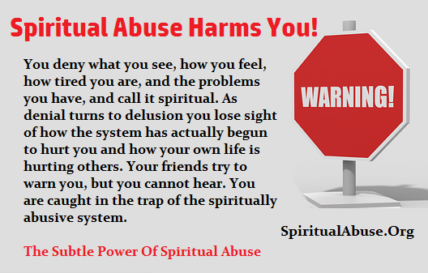The following article is written by a woman who wishes to remain anonymous. It is about Independent Fundamental Baptist churches, though others will also relate.
In my preteen years, I was taught to believe that expressing any negativity in any way was a way to show that I did not actually possess the Fruit of the Spirit (or evidence I was saved). Since the qualities included “joy” and “peace,” any sign of discouragement, depression, sadness, anxiety, was taken as a sign that I was under the devils influence. If I was under the influence of Satan, I was either “backslidden” or not truly saved.
Therefore, anytime I was in public, I was reminded by my mother, or people in my church, that in order to be a “good witness” for Christ (and not give God a bad name in the process), I had to put on my happy face. And I did so.
Anyone who saw me in my teenage years would have imagined that I was living a life of pure bliss. I was smiling literally ALL of the time. I always acted cheerful, even though inside, I was deeply depressed (in fact, nowadays, when I see a girl who smiles too much, I worry for her). I radiated what appeared to be pure joy, “the joy of the Lord,” so to speak.
However, I remember sitting in my room by myself, day by day, and being just so incredibly depressed. I would lie there, reading books or drawing pictures, and thinking to myself, “What is the purpose of living, if you’re just going to die anyway,” “Does anyone really care about me? Why do I actually exist at all,” and sometimes my thoughts would gravitate to how scary death would be. I would imagine my funeral and wonder how many people would show up if I died. I truly believe the only reason I didn’t commit suicide was because of the intense fear I had of going through the torment of the fires of Hell.
I remember one time, passing a note to my friend at church, which said, “If I died tomorrow, would you go to my funeral?” At the time, it seemed perfectly normal to ask such a question.
I sang a lot of “specials” (songs) at the church regarding joy. Here’s an example:
But what I couldn’t understand through the years was…why didn’t I feel this joy I sang of? I was living a lie, but was not allowed to acknowledge this fact. It was forced to be a secret buried deep within myself, and I despised it.
My mother frequently read my diary, so I never felt quite like I was able to be honest in it. Yet, I felt a deep desire to write! So sometimes I would begin a journal entry, and I would be honest about feeling bad…then I would consider whether the entry would be a “bad witness” for Christ. I worried that if I was to die that day and someone was to find it, they might think badly of God and therefore be denied the opportunity to be saved, so I would actually erase the entry and change it into something that looked “positive.”
For instance, I would think, “I feel so lonely. Why am I not happy? What is the purpose in life? There is no meaning in anything! The kids told me I was ugly today and it really hurt my feelings,” but I would write, “Today was such a BEAUTIFUL day! The sun was shining and I got to go to church and see my friend. Someone got saved today, and I’m so happy for them! I can’t wait to see what happens tomorrow!”
If you read my journal back then, it might have seemed that things were good, but they were actually tragically bad. And this actually was a problem for years into my marriage also. I was unable to allow myself to believe anything was ever bad. This denial caused me to not be able to confront issues as they arrived and I went through much unnecessary hardship as a result.
The Bible NEVER condemns feeling sad, or anger, or any other God given emotions. Our emotions were given to us by God to help us to see and address problems in our lives. They are tools to help us, and they are not sin in and of themselves. Ephesians 4:26 says “Be angry, and do not sin. Don’t let the sun go down on your wrath.” It does not say not to be angry, but not to allow that anger to cause you to SIN.
David poured out many tears to God, and expressed deep sorrow multiple times, and yet he was considered “a man after God’s own heart.” The Bible says that He knows our suffering intimately, and cares for us. He has experienced the same types of pain we have, while existing in human form on earth, and He knows our suffering and carries our burdens on His own shoulders when we give them to Him. Jesus – even though he was GOD HIMSELF and knew the final outcome of the situation- WEPT with Martha and Mary over Lazarus. He knows our emotions and does not hold them against us. He gave them for us, to help us heal. They are a GOOD thing.
If you have grown up with the idea that being true to who you are, and expressing emotions is a negative thing, or that God would be upset with you for expressing any sad, angry, or hurt feelings, please know that the God in scripture does not EVER express such an idea. Emotions are a gift from God. Being honest with who we are and what we feel is healthy. Being dishonest and wearing a mask is unhealthy and breeds resentment, and continues the cycles of depression. We must be honest with our emotions in order to find healing.
JOY does not necessarily mean that every moment you feel happy. True spiritual joy is in knowing that despite the trials we face here on earth, we have a Heavenly Father who loves us and that NOTHING can separate us from His love. We can pour out our hearts HONESTLY to Him, and do not have to hold back our anger, tears, pain, disillusionment, etc. He understands, is patient with us, and helps us to heal with the tools he has given us – our emotions.
********
Shop at our Amazon store! As an Amazon Influencer, this website earns from qualifying purchases.




